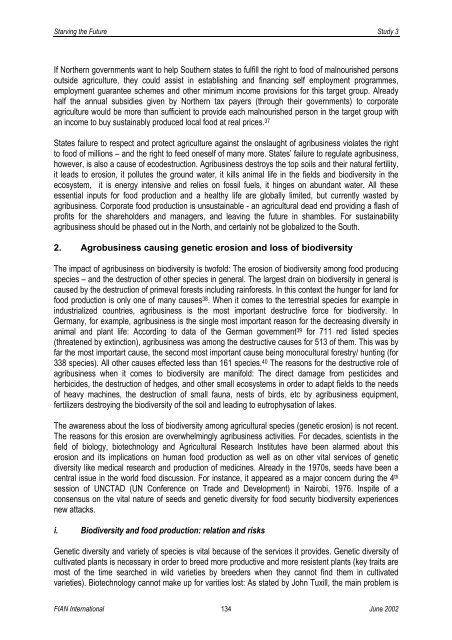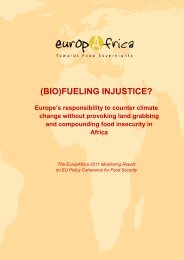Study 3: Ecodestruction and the Right to Food: The Cases of Water ...
Study 3: Ecodestruction and the Right to Food: The Cases of Water ...
Study 3: Ecodestruction and the Right to Food: The Cases of Water ...
Create successful ePaper yourself
Turn your PDF publications into a flip-book with our unique Google optimized e-Paper software.
Starving <strong>the</strong> Future <strong>Study</strong> 3<br />
If Nor<strong>the</strong>rn governments want <strong>to</strong> help Sou<strong>the</strong>rn states <strong>to</strong> fulfill <strong>the</strong> right <strong>to</strong> food <strong>of</strong> malnourished persons<br />
outside agriculture, <strong>the</strong>y could assist in establishing <strong>and</strong> financing self employment programmes,<br />
employment guarantee schemes <strong>and</strong> o<strong>the</strong>r minimum income provisions for this target group. Already<br />
half <strong>the</strong> annual subsidies given by Nor<strong>the</strong>rn tax payers (through <strong>the</strong>ir governments) <strong>to</strong> corporate<br />
agriculture would be more than sufficient <strong>to</strong> provide each malnourished person in <strong>the</strong> target group with<br />
an income <strong>to</strong> buy sustainably produced local food at real prices. 37<br />
States failure <strong>to</strong> respect <strong>and</strong> protect agriculture against <strong>the</strong> onslaught <strong>of</strong> agribusiness violates <strong>the</strong> right<br />
<strong>to</strong> food <strong>of</strong> millions – <strong>and</strong> <strong>the</strong> right <strong>to</strong> feed oneself <strong>of</strong> many more. States’ failure <strong>to</strong> regulate agribusiness,<br />
however, is also a cause <strong>of</strong> ecodestruction. Agribusiness destroys <strong>the</strong> <strong>to</strong>p soils <strong>and</strong> <strong>the</strong>ir natural fertility,<br />
it leads <strong>to</strong> erosion, it pollutes <strong>the</strong> ground water, it kills animal life in <strong>the</strong> fields <strong>and</strong> biodiversity in <strong>the</strong><br />
ecosystem, it is energy intensive <strong>and</strong> relies on fossil fuels, it hinges on abundant water. All <strong>the</strong>se<br />
essential inputs for food production <strong>and</strong> a healthy life are globally limited, but currently wasted by<br />
agribusiness. Corporate food production is unsustainable - an agricultural dead end providing a flash <strong>of</strong><br />
pr<strong>of</strong>its for <strong>the</strong> shareholders <strong>and</strong> managers, <strong>and</strong> leaving <strong>the</strong> future in shambles. For sustainability<br />
agribusiness should be phased out in <strong>the</strong> North, <strong>and</strong> certainly not be globalized <strong>to</strong> <strong>the</strong> South.<br />
2. Agrobusiness causing genetic erosion <strong>and</strong> loss <strong>of</strong> biodiversity<br />
<strong>The</strong> impact <strong>of</strong> agribusiness on biodiversity is tw<strong>of</strong>old: <strong>The</strong> erosion <strong>of</strong> biodiversity among food producing<br />
species – <strong>and</strong> <strong>the</strong> destruction <strong>of</strong> o<strong>the</strong>r species in general. <strong>The</strong> largest drain on biodiversity in general is<br />
caused by <strong>the</strong> destruction <strong>of</strong> primeval forests including rainforests. In this context <strong>the</strong> hunger for l<strong>and</strong> for<br />
food production is only one <strong>of</strong> many causes 38. When it comes <strong>to</strong> <strong>the</strong> terrestrial species for example in<br />
industrialized countries, agribusiness is <strong>the</strong> most important destructive force for biodiversity. In<br />
Germany, for example, agribusiness is <strong>the</strong> single most important reason for <strong>the</strong> decreasing diversity in<br />
animal <strong>and</strong> plant life: According <strong>to</strong> data <strong>of</strong> <strong>the</strong> German government 39 for 711 red listed species<br />
(threatened by extinction), agribusiness was among <strong>the</strong> destructive causes for 513 <strong>of</strong> <strong>the</strong>m. This was by<br />
far <strong>the</strong> most importart cause, <strong>the</strong> second most important cause being monocultural forestry/ hunting (for<br />
338 species). All o<strong>the</strong>r causes effected less than 161 species. 40 <strong>The</strong> reasons for <strong>the</strong> destructive role <strong>of</strong><br />
agribusiness when it comes <strong>to</strong> biodiversity are manifold: <strong>The</strong> direct damage from pesticides <strong>and</strong><br />
herbicides, <strong>the</strong> destruction <strong>of</strong> hedges, <strong>and</strong> o<strong>the</strong>r small ecosystems in order <strong>to</strong> adapt fields <strong>to</strong> <strong>the</strong> needs<br />
<strong>of</strong> heavy machines, <strong>the</strong> destruction <strong>of</strong> small fauna, nests <strong>of</strong> birds, etc by agribusiness equipment,<br />
fertilizers destroying <strong>the</strong> biodiversity <strong>of</strong> <strong>the</strong> soil <strong>and</strong> leading <strong>to</strong> eutrophysation <strong>of</strong> lakes.<br />
<strong>The</strong> awareness about <strong>the</strong> loss <strong>of</strong> biodiversity among agricultural species (genetic erosion) is not recent.<br />
<strong>The</strong> reasons for this erosion are overwhelmingly agribusiness activities. For decades, scientists in <strong>the</strong><br />
field <strong>of</strong> biology, biotechnology <strong>and</strong> Agricultural Research Institutes have been alarmed about this<br />
erosion <strong>and</strong> its implications on human food production as well as on o<strong>the</strong>r vital services <strong>of</strong> genetic<br />
diversity like medical research <strong>and</strong> production <strong>of</strong> medicines. Already in <strong>the</strong> 1970s, seeds have been a<br />
central issue in <strong>the</strong> world food discussion. For instance, it appeared as a major concern during <strong>the</strong> 4 th<br />
session <strong>of</strong> UNCTAD (UN Conference on Trade <strong>and</strong> Development) in Nairobi, 1976. Inspite <strong>of</strong> a<br />
consensus on <strong>the</strong> vital nature <strong>of</strong> seeds <strong>and</strong> genetic diversity for food security biodiversity experiences<br />
new attacks.<br />
i. Biodiversity <strong>and</strong> food production: relation <strong>and</strong> risks<br />
Genetic diversity <strong>and</strong> variety <strong>of</strong> species is vital because <strong>of</strong> <strong>the</strong> services it provides. Genetic diversity <strong>of</strong><br />
cultivated plants is necessary in order <strong>to</strong> breed more productive <strong>and</strong> more resistent plants (key traits are<br />
most <strong>of</strong> <strong>the</strong> time searched in wild varieties by breeders when <strong>the</strong>y cannot find <strong>the</strong>m in cultivated<br />
varieties). Biotechnology cannot make up for varities lost: As stated by John Tuxill, <strong>the</strong> main problem is<br />
FIAN International 134<br />
June 2002
















